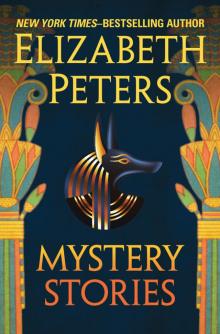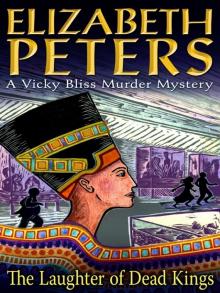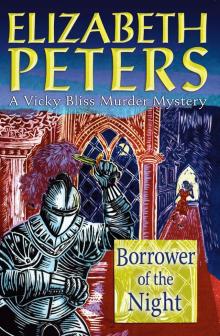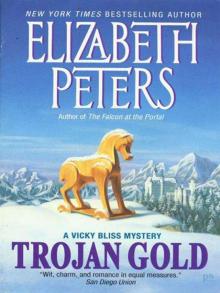- Home
- Elizabeth Peters
Silhouette in Scarlet vbm-3 Page 4
Silhouette in Scarlet vbm-3 Read online
Page 4
Though the hour was well after midnight, the ground floor windows of the restaurant and bar were brightly lit, and people streamed in and out of the main doors. Leif escorted me to the desk and waited till I asked for my key. When the clerk handed it over, he also gave me a small sheaf of messages.
‘There were several calls, Dr Bliss. If it is urgent, our switchboard will be open.’
Leif had stood to one side like a little gent, pretending not to listen when I mentioned my room number. Curiosity got the better of him when he saw the messages.
‘I hope nothing is wrong,’ he said.
I held the papers up so he could read them. ‘They’re all from Schmidt. Head of the National Museum, as you surely must know.’
‘Vicky, you do not need to convince me – ’
‘Just thought I’d mention it.’
‘He seems to want you very badly.’
‘I know what he wants. It’s not important. Well . . .’
I stuffed the notes in my purse and turned from the desk. Leif bowed stiffly. ‘Good night, Vicky. Sleep well.’
‘Oh,’ I said. ‘Good night. And thanks.’
‘May I telephone you tomorrow?’
‘Yes, you may.’
He bowed again, turned on his heel, and strode away, moving with military precision.
Feigning personal interest is one way of keeping tabs on a suspect. I preferred to believe he wasn’t feigning. He was a gorgeous sight as he made his lordly way through the lesser mortals in the lobby; his flaxen hair clung to his head and covered the nape of his neck like a gilt helmet.
The pleasures of the past few hours had not let me forget certain other matters. I went into my room with all the panache of the Cowardly Lion, an inch at a time, and I didn’t relax until after I had searched every corner. No one was there. As far as I could tell, no one had been there.
Four of Schmidt’s messages were labelled ‘Urgent.’ Before I called him, I had a nice leisurely bath and made myself a cup of coffee with my handy plug-in electric pot. Schmidt is something of a night owl, and besides, I didn’t particularly care whether I woke him up. He had his nerve, harassing me when I hadn’t even been gone a day.
Naturally I called collect. He wanted to talk; he could pay. He accepted the call without so much as a gulp, and it was then that I began to think I had been mistaken about his reason for calling.
He didn’t even say hello. ‘What are you up to now?’ he shrieked. ‘What is it you think you are doing? A little holiday, you say. The land of your ancestors, you say. You betray me, you lie to me – your friend, your benefactor, your – ’
‘Wait a minute! I didn’t lie to you, Schmidt. Would I do a thing like that?’
‘Yes.’ He stopped to catch his breath. When he resumed he had evidently decided to try subtler tactics. His voice wheedled. ‘Is it a case like the Riemenschneider, my dear Vicky? Another prize for our museum?’
He was referring to an art object by a medieval German sculptor, which I had located after it had been lost for four hundred years. I had met Schmidt during that bizarre business, and though I would be the first to admit that I had a certain amount of assistance in my quest (none from Schmidt; he was a first-class nuisance from beginning to end), my success had given him an exaggerated idea of my abilities.
‘No.’ I made the negative as convincing as I could. Once Schmidt got a notion in his big round bald head, nothing less than a blunt instrument could get it out. I didn’t want him rushing off to Sweden to join in the fun. Where the museum was concerned, he was almost as crooked as John. The two of them together . . . Well, the very idea made cold sweat pop out on my brow.
‘I resent your attitude,’ I went on. ‘You have no right to make accusations.’
Usually Schmidt crumples up when he is attacked. Not this time. ‘You tell me it is nothing that today I should hear from three persons calling themselves cousins and wishing urgently to find you? Never in all these years has one cousin called. Now it is three in a single day.’
‘I have about two hundred cousins,’ I said, after a moment’s thought ‘We’re a prolific family.’
‘Three? In one day?’
‘Did they leave their names?’
‘Oh, certainly. One was Cousin Bob.’
I have a Cousin Bob. Last I heard he was living in Chicago with his fourth wife and holding down three jobs in order to keep up with his child-support payments. As I said, we are a prolific family. It was barely conceivable that Bob might be in Europe, but it was damned unlikely.
‘That’s one,’ I said encouragingly.
‘Number two was Cousin George.’ Schmidt’s voice dripped with sarcasm.
I really do have a lot of cousins. I could not recall one named George.
‘That’s two. Didn’t anyone give a last name?’
‘Number three did so.’ Schmidt sounded genuinely puzzled. ‘He was different from the others, Vicky. He was the first to telephone, and when he said he was the Swedish cousin whom you planned to visit, I thought only that you had missed one another.’
A hideous qualm passed through me, surpassing in hideousness all the minor qualms I had felt in the course of the day. I croaked, ‘I hope to God you didn’t tell him where I was staying.’
‘You take me for an old fool? I told him I could not do that, and he was most gracious. Indeed, he was kind enough to approve. He was glad, he said, that you had so careful and sensible a friend.’
‘Thanks, Papa Schmidt,’ I said sincerely.
‘Bah,’ said Schmidt. ‘He was an old papa too, Vicky. At least his voice sounded like that of an elderly man, and he gave to me not only his name and address but references from everyone except God.’
‘What?’
‘You don’t hear me? His name is Gustaf Jonsson.’ He spelled it. ‘Was not Johnsson your mother’s name?’
‘My father’s mother. How did you know that? You’ve been snooping in my files again, Schmidt.’
‘Mr Gustaf Jonsson told me,’ Schmidt said stiffly.
I apologized. Schmidt does snoop, sometimes looking for rough drafts of Rosanna’s future adventures (little does he know I make them up as I go along), and sometimes out of general inquisitiveness. I don’t mind. It keeps him happy.
‘Hmph,’ said Schmidt, when I had abased myself sufficiently. ‘Have you a pencil? I give you the address and telephone of Mr Jonsson. He asks that you call him.’
I reached for my purse and then remembered my notebook was no longer in it. I wrote the information on the back of one of the messages.
‘Okay,’ I said. ‘Thanks.’
‘I hope you have cause to thank me,’ Schmidt said ominously. ‘Vicky, I am not happy about this.’
I wasn’t happy about it either. However, I tried to sound more puzzled than alarmed as I questioned Schmidt about my callers. He couldn’t tell me much more. ‘Bob’ and ‘George’ both had ordinary voices, without any accent Schmidt could distinguish. Neither had pressed him for further information after learning that I was out of the country and was not expected back for several weeks. By contrast Mr Jonsson had been absolutely loquacious. He really had given Schmidt references – two banks and a former minister of state.
‘Well, it’s all very mysterious,’ I said. ‘I appreciate everything you did, Schmidt – and everything you didn’t do. I’ll be in touch.’
I didn’t expect to get rid of him that easily, and I didn’t. Admonitions, warnings, and suggestions gushed out of him. Finally I hung up.
I got up off the bed where I had been reclining and went to the window. My room was in the front of the hotel, overlooking the quay. I suspected I owed that choice location to Schmidt’s influence.
Directly opposite, the ‘City Between the Bridges’ filled its island from shore to shore, its close-packed structures rising in successive tiers. It looked like a single giant building, a citadel or castle, with a thousand lighted windows, and the dark water, streaked with splinters of reflected light, might
have been a protective moat.
It was so beautiful I forgot my troubles for a minute and just enjoyed the view. Then I turned my attention to more practical matters, noting with approval that my room was on the fourth (European) floor, and that the nearest balcony was a considerable distance away, below and to the right. The street and the quay in front of the hotel were bright as daylight. Nobody could get at me by way of the window unless he was a human fly. Which John might well be, but being also a cautious man, he would hardly risk crawling up the front of a fully lighted building in plain view of a hundred people.
John was the first person I thought of when Schmidt started listing unknown ‘cousins.’ On second thought, however, I doubted that he had been one of them. He wouldn’t call himself Bob or George; he’d have given some crazy name like Agrivaine. Also, there was no reason for him to check up on my whereabouts. He knew where I was. He had seen me. No doubt he had also seen the label on my suitcase; he had eyes like a vulture’s.
Leif might have been one of the ‘cousins,’ checking to make sure that the woman he had seen at the airport carrying Dr Victoria Bliss’s bags was the real Victoria Bliss and not a ringer. But that didn’t make sense either. If he was a policeman, he could inquire through official channels without inventing unimaginative names. If he was a policeman . . .
I would have liked to believe that Bob and George were John and Leif. The alternative, that several parties unknown and probably inimical were on my trail, was distinctly unpleasant. Most peculiar of all was Cousin Gustaf. Should I get in touch with him? First I thought I would. Then I thought I had better leave well enough alone. Then I decided I would go to bed and let my subconscious wrestle with the dilemma. I have a great deal of faith in my subconscious. Sometimes it’s the only part of my brain that works.
Chapter Three
WHEN I WOKE UP next morning I felt terrible. At first I couldn’t imagine why. Then I remembered my cousins. The dilemma was still unresolved. Apparently my subconscious had taken the night off.
It wasn’t until I was brushing my teeth that the dream came back to me.
Not surprisingly, Leif had been the featured actor. Dressed in leggings and a tunic open to the waist, his fair hair shoulder length, he wore a smith’s leather apron and flourished a hammer the size of Thor’s fabled Mjolnir. Outside the crude shelter where he was working was a sign: ‘Wayland’s Smithy; Good Work at Low Prices. If you didn’t get it at Wayland’s, you paid too much.’
Hypnotized by the ripple of bronzed muscle on his arms and chest, I didn’t notice the object on the anvil till his great hammer was high in the air. It wasn’t a sword or a piece of armour, it was a chalice – a footed cup made of silver and bound with strips of gold. Inlaid garnets and scarlet enamel flashed in the light.
My dream self sprang forward with a voiceless shriek, trying to save the precious thing. I was too slow; but just before the hammer struck, a figure materialized out of nowhere and a long, thin arm snatched the chalice away. The figure was that of the silhouette cutter, his face no longer meek and humble, but set in a grin of fiendish triumph. He clutched the chalice to his meagre bosom. The hammer crashed on the anvil, starting a progression of ringing vibrations that grew louder and louder. The silhouette cutter began to vibrate, as if the atoms of his body were spinning off into space. His body faded until nothing was left but his grin – and the shape of the chalice, blazing with internal light so dazzling it hurt my eyes.
I decided I needed a cup of coffee. Or three.
While I made it and drank it, I sent a silent apology to my subconscious. It hadn’t solved the problem I had set it before I went to bed – to call or not to call Cousin Gustaf – but it had reminded me of something important.
Leif’s presence in the dream probably didn’t mean anything except that all of my mind, sub – and super-conscious, has excellent taste. The silhouette cutter was one of those random contributions one often finds in dreams; he was a bizarre figure, and the encounter had been unusual. The point of the dream was the chalice. It had numerous mythic connotations – Arthurian legend, the Holy Grail, the chalice from the palace . . . No, that was from an old Danny Kaye movie.
I wrenched my frivolous mind back to business. The important thing was that the dream chalice was no figment of my imagination. It actually existed. I had seen a photograph of it only a few days before.
I had been kidding myself when I tried to dismiss ‘Wayland’s work’ as a meaningless joke. The phrase had nagged at me for days, while I packed and shopped and cleaned out the fridge and called the kennel and performed all the other chores my temporary absence required. Finally, the day before I was due to leave, I succumbed. I spent several hours in the museum library, looking up objects to which that enigmatic description might apply.
The reference was even more ambiguous than I had supposed. Wayland was a northern god originally, but his story had travelled far and endured for centuries. ‘Wayland’s work’ might describe an art object produced anywhere in northern Europe over a period of several hundred years – Anglo-Saxon, Viking, Celtic – or even treasures brought back from Russia or Byzantium by far-ranging Scandinavian traders.
‘That’s not my field’ is a statement often made by scholars to excuse their ignorance when they are asked to explain something they don’t understand. However, northern Europe between 400 and 1100 a.d. is not my field. As I browsed in the library that afternoon, going farther and farther from my original research as my interest increased, I realized that, like a good many people, I had underestimated my remote ancestors.
The popular impression of the Germanic tribes is that of bloody-minded savages trampling the delicate blossoms of civilization underfoot. In all the stories I had read they were the villains. The Vikings burned villages, looted churches, raped and murdered; the Saxons fought noble King Arthur and the knights of the Round Table; the Vandals gave their name to successive generations of destroyers. Admittedly they were a crude lot, but their opponents weren’t much better. They were courageous explorers, fighters, and traders. The might of Rome, which had crushed the civilized empires of the Near East, faltered and fell in the German forests. Many a Roman standard graced the hut of a Germanic chieftain after the defeat of the legion that had carried it.
The Vikings became the finest seamen of their time, daring the perils of the unknown west. Even I knew that Leif the Lucky had been the first to discover America, centuries before Columbus. What I didn’t know, or had forgotten, was that the Scandinavians also followed the caravan routes to the east. The tribes from whom the name ‘Russia’ derives were northerners. Tall blond warriors formed the honour guard of the emperors of Byzantium, and traders brought back coins minted in Damascus, Baghdad, and Tashkent. As a runic inscription on an ancient tombstone put it, ‘Valiantly we journeyed afar for gold; and in the east we fed the eagles.’
Among the objects brought back to Scandinavia by traders or looters was the chalice of my dream. Discovered by a farmer ploughing his field, it had been buried over a thousand years earlier by an owner fearing attack on his home. He had never retrieved it. Perhaps the powdery traces of his bones had been scattered by the same plough that turned up his treasure.
The chalice was now in a private collection in Stockholm, which undoubtedly explained its appearance in my dream. The name and address of the museum was in my lost notebook, along with other notes I had taken that afternoon. The loss was not irretrievable; I could find the same reference books in local institutions. Or I could call Gerda, Schmidt’s secretary, and ask her to look up the information.
The hell with it, I thought. And the hell with Cousin Gustaf, too. No busman’s holidays for me.
I hung around the room for another hour, fighting off energetic chambermaids who wanted to clean, and hoping the telephone would ring. I used all the makeup I normally don’t have time to bother with, and tried on three different outfits before I settled on white slacks and T-shirt, with a kelly green scarf. I did my nails. The phon
e still didn’t ring, so I cleaned out my purse. Among the papers in it was the slip of paper on which I had scribbled Cousin Gustaf’s address. Schmidt had also given me the references Gustaf had mentioned. Odd, that; it was the sort of thing John might do, inventing unnecessary and seemingly respectable references to disarm suspicion. One of the banks was in Stockholm. I toyed with the idea of calling, but my resentment against all the known and unknown characters who were trying to louse up my vacation was too strong. I put the papers back in my purse. The phone did not ring. I threw away the jelly doughnut. The phone did not ring.
At eleven o’clock I admitted the maid. The hell with Leif too. I would dedicate the day to sightseeing and shopping of the most frivolous kind. No museums, no antiquities. Maybe I could pick up another tall blond. There were plenty of them in Sweden.
Stockholm, which is often cool and rainy, put on one of her better shows for me that day. The colours were those of springtime innocence – clear greens, sparkling blues, soft red brick, and creamy buff. The breeze was just cool enough to justify my decision to look for a hand-knit ski sweater.
I moved out of the way of the stream of traffic, pedestrian and vehicular, that passed the doors of the Grand Hotel, and consulted my pocket map of Stockholm. Up Kungsträdgårdsgatan, along the park, to Hamngatan; wriggle through a small square and a side street to Drottninggatan, ‘long, narrow and filled with tiny shops,’ according to the guidebook.
Presumably I followed that route, and obviously I did not get hit by a taxi, but I don’t remember a thing about it. The shop windows finally roused me from my reveries. Clothes and food (and a couple of other things) appeal to basic instincts even more compelling than the worries that continued to nag at my mind. I tried on fifteen or sixteen sweaters, each more gorgeous than the last. The one I bought was a blend of green and grey and red and black, with silver clasps; and after I had paid for it I decided I had better start thinking seriously about finding a cheaper hotel. Prices were lower than in Munich, but not much.

 Mystery Stories
Mystery Stories A River in the Sky
A River in the Sky He Shall Thunder in the Sky taps-12
He Shall Thunder in the Sky taps-12 Laughter of Dead Kings vbm-6
Laughter of Dead Kings vbm-6 Silhouette in Scarlet vbm-3
Silhouette in Scarlet vbm-3 Night Train to Memphis vbm-5
Night Train to Memphis vbm-5 Borrower of the Night vbm-1
Borrower of the Night vbm-1 The Golden One
The Golden One Trojan Gold vbm-4
Trojan Gold vbm-4 Crocodile On The Sandbank
Crocodile On The Sandbank